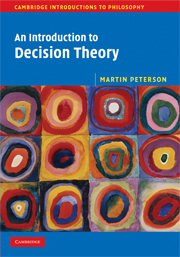Book contents
- Frontmatter
- Contents
- Preface
- 1 Introduction
- 2 The decision matrix
- 3 Decisions under ignorance
- 4 Decisions under risk
- 5 Utility
- 6 The mathematics of probability
- 7 The philosophy of probability
- 8 Why should we accept the preference axioms?
- 9 Causal vs. evidential decision theory
- 10 Bayesian vs. non-Bayesian decision theory
- 11 Game theory I: Basic concepts and zero-sum games
- 12 Game theory II: Nonzero-sum and cooperative games
- 13 Social choice theory
- 14 Overview of descriptive decision theory
- Appendix A Glossary
- Appendix B Proof of the von Neumann–Morgenstern theorem
- Further reading
- Index
6 - The mathematics of probability
- Frontmatter
- Contents
- Preface
- 1 Introduction
- 2 The decision matrix
- 3 Decisions under ignorance
- 4 Decisions under risk
- 5 Utility
- 6 The mathematics of probability
- 7 The philosophy of probability
- 8 Why should we accept the preference axioms?
- 9 Causal vs. evidential decision theory
- 10 Bayesian vs. non-Bayesian decision theory
- 11 Game theory I: Basic concepts and zero-sum games
- 12 Game theory II: Nonzero-sum and cooperative games
- 13 Social choice theory
- 14 Overview of descriptive decision theory
- Appendix A Glossary
- Appendix B Proof of the von Neumann–Morgenstern theorem
- Further reading
- Index
Summary
The following decision problem appeared some years ago in Marilyn vos Savant's Ask Marilyn column in the Parade Magazine.
You are a contestant in a game show hosted by Monty Hall. You have to choose one of three doors, and you win whatever is behind the door you pick. Behind one door is a brand new car. Behind the other two is a goat. Monty Hall, who knows what is behind the doors, now explains the rules of the game: “First you pick a door without opening it. Then I open one of the other doors. I will always pick a door to reveal a goat. After I have shown you the goat, I will give you the opportunity to make your final decision whether to stick with your initial door, or to switch to the remaining door.” Should you accept Monty Hall's offer to switch?
The Monty Hall problem has a simple and undisputable solution, which all decision theorists agree on. If you prefer to win a brand new car rather than a goat, then you ought to switch. It is irrational not to switch. Yet, a considerable number of Marilyn vos Savant's readers argued that it makes no difference whether you switch or not, because the probability of winning the car must be 1/3 no matter how you behave. Although intuitively plausible, this conclusion is false.
The point is that Monty Hall's behaviour actually reveals some extra information that makes it easier for you to locate the car.
- Type
- Chapter
- Information
- An Introduction to Decision Theory , pp. 117 - 132Publisher: Cambridge University PressPrint publication year: 2009

